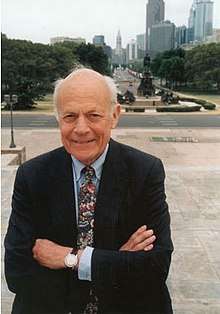Walter Pollak
Walter Pollak (1887–1940) was a 20th-century American civil liberties lawyer, who worked with other important, radical lawyers in the 1920s and 1930s, most famously to defend Communist Benjamin Gitlow before the Supreme Court and the Scottsboro Boys.[1][2]
Background
Walter Heilprin Pollak was born on June 4, 1887, in Summit, New Jersey to Gustav Pollak (born circa 1849 in Vienna, Austria; died 1919) and Celia Heilprin in a family of "bookish, nonreligious Jews" who had come to the States in the 1850s. His father was an editor and writer for The Nation magazine. Walter Pollak attended DeWitt Clinton High School and then Columbia University in New York City. In 1907, he graduated from Harvard University and in 1910 from Harvard Law School.[1][2][3]
Career

Pollak first joined the law firm of Sullivan and Cromwell but within two years had moved to Simpson, Warren and Cardozo, where he started a lifelong friendship with Benjamin N. Cardozo (who in 1913 left the firm to become a New York Supreme Court Justice). Pollak stayed on, and the firm eventually became Engelhard, Pollak, Pitcher, Stern and Clarke.[1][2]
During the 1920s, according to Max Lowenthal, Pollak was part of a "loose partnership" of radical attorneys that included Joseph R. Brodsky, Swinburne Hale, Walter Nelles, Isaac Shorr, Carol Weiss King, and King's brother-in-law Carl Stern.[4][5][6][7][8]
.jpg)
In 1925, on behalf of the American Civil Liberties Union (ACLU), he argued his first case before the United States Supreme Court in Gitlow v. New York, defending Communist Party member Benjamin Gitlow against his conviction for "advocacy of criminal anarchy." The court upheld Gitlow's conviction but importantly recognized that the due process clause of the 14th Amendment incorporated and thus protected fundamental provisions of the Bill of Rights, including the freedom of speech. (New York State Governor Al Smith commuted Gitlow's sentence.)[1]
In the early 1930s, on behalf of International Labor Defense, Pollak joined the defense team of the Scottsboro Boys with Joseph R. Brodsky. He took an active part in framing the appeals in Powell v. Alabama (1932), as well as Norris v. Alabama and Patterson v. Alabama (both 1935), the latter which he argued with the support of the ACLU.[1]
In 1937, early in the Great Depression, the firm dissolved. Pollak became of counsel to Cohen, Cole, Weiss, and Wharton (which became Paul, Weiss, Rifkind, Wharton and Garrison).[1]
Personal and death

Pollak was the father of United States District Court for the Eastern District of Pennsylvania Judge Louis Heilprin Pollak, who had served as dean of both Yale Law School and the University of Pennsylvania Law School.
He was a close friend of law professor Zechariah Chafee Jr..[1]
Pollak died age 53 on October 2, 1940, of a heart attack.[1]
See also
References
- Pollak, Louis H. (2009). "Pollak, Walter Heilprin (1887–1941)". In Newman, Roger K. (ed.). The Yale Biographical Dictionary of American Law. Yale University Press. p. 430. Retrieved 2 December 2017.
- Walker, Samuel. "Pollak, Walter Heilprin". American National Biography. Retrieved 2 December 2017.
- "Gustav Pollak". Cambridge Chronicle. 8 November 1919. Retrieved 2 December 2017.
- Hearings of the United States Congress House Committee on Un-American Activities. US GPO. 1950. p. 2979 (Lowenthal), 2988 (death), 2992. Retrieved 27 September 2017.
- "Carol Weiss King". Jewish Women: A Comprehensive Historical Encyclopedia. Retrieved 27 December 2010.
- "United States ex rel. Brazier et al. v. Commissioner of Immigration at Port of New York". Court Listener. 15 December 1924. Retrieved 27 December 2010.
- "King, Carol Weiss (1895–1952)". Women in World History: A Biographical Encyclopedia. 18 May 2010. Retrieved 27 September 2017.
- "United States ex rel. Giletti v. Commissioner oof Immigration, Ellis Island, New York Harbor". Court Listener. 4 November 1929. Retrieved 28 September 2017.
External sources
- Pollak, Louis H. (2009). "Pollak, Walter Heilprin (1887–1941)". In Newman, Roger K. (ed.). The Yale Biographical Dictionary of American Law. Yale University Press. p. 430. Retrieved 2 December 2017.
- Chafee Jr., Zechariah (12 October 1940). "Walter Heilprin Pollak". The Nation.
- Pollak, Louis H. (1982). "Advocating Civil Liberties: A Young Lawyer Before an Old Court". 17. Harvard Civil Rights–Civil Liberties Law Review: 1. Cite journal requires
|journal=(help)